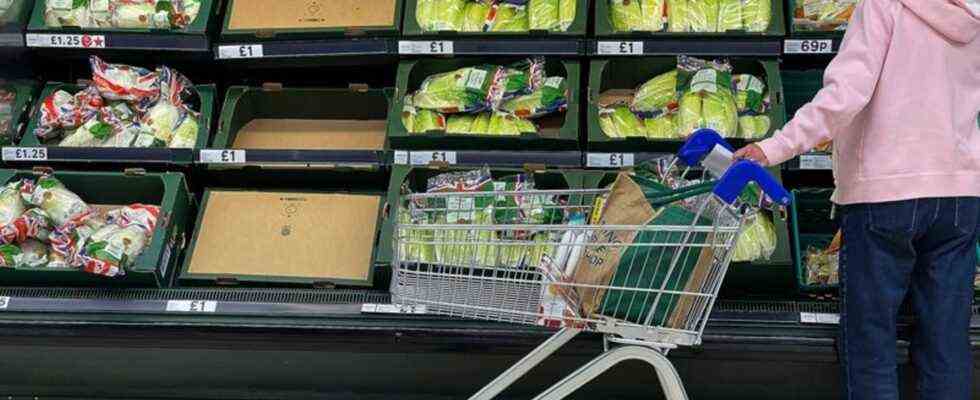retail trade
Britons have less choice in terms of food and alcohol
A woman stands in front of partially empty shelves in a London supermarket. Photo: Frank Augstein / AP / dpa
© dpa-infocom GmbH
There is still a shortage of truck drivers in Great Britain. The government wants to attract foreign specialists with thousands of special visas. But the response doesn’t seem to be too high.
Due to a lack of truck drivers, people in Great Britain have to prepare for fewer food and alcoholic beverages at Christmas time.
“The truck driver shortage has already left some gaps on the shelves and the situation could get worse in the run-up to Christmas,” said Andrew Opie of the British Retail Consortium (BRC). Retailers would give preference to groceries and other traditional Christmas products.
It currently takes two to three days to get fresh food from the ports to the supermarkets, said the head of the Cold Chain Federation, Shane Brennan. Delivery on the same day or the next day at the latest is normal. For frozen food, this range has grown from two to three to five to six days. The industry association of alcohol producers Wine & Spirit Association (WSTA) reported that some members now needed 15 instead of 2 to 3 days to complete orders.
“We are already experiencing considerable delays in delivery times for wine and spirits,” said WSTA boss Miles Beale. “That drives up costs and limits the range of products available to British consumers.” Arrival times of drivers and vehicles are becoming increasingly unpredictable, the association wrote in an open letter to Transport Minister Grant Shapps. This leads to goods not being ready on time or waiting a long time to be picked up. Now business losses threatened. In addition, costs rose: Freight companies had increased delivery charges by seven percent in order to raise salaries for drivers. This is particularly overwhelming for smaller companies.
Brennan of the Cold Chain Association confirmed that the industry needs to prioritize product delivery. “It’s not about bottlenecks, but about simplification,” he told a parliamentary committee in London. Reaches and quantities played a role here. It is a matter of reducing some products “strategically” so that the things that are expected are also on the shelves. BRC expert Opie called on consumers to be considerate. You shouldn’t change your shopping behavior.
The UK has long been desperately looking for truck drivers. According to the Road Haulage Association, up to 100,000 truck handlebars are missing. The problem is also big in other countries like Germany. But because of strict immigration rules since Brexit, the UK has been hit harder. The government issued up to 4,700 special visas for foreign drivers in the fall. How many applications there are, but she did not want to say when asked.
In its open letter, the WSTA called for the temporary visa exemptions to be significantly extended to at least one year.

